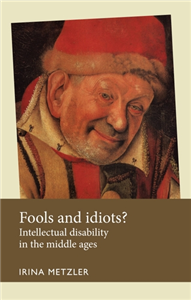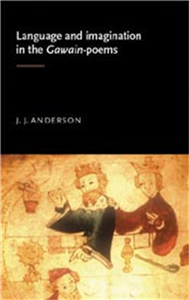Your Search Results
-
Ediciones Uniandes / Universidad de los Andes
Ediciones Uniandes, Universidad de los Andes’s press, in Bogotá, Colombia, publishes scholarly books and music CDs, thus making available the research and arts production of professors and researchers within the university. Our aim is to consolidate a rigorous catalog with high academic and editorial standards, and to publish relevant titles while promoting collaboration with other key institutions, both in Colombia and abroad, and intercultural exchange; we also support editorial policies such as open access. Our catalog includes a wide range of topics with special emphasis on Social Sciences, Humanities and Law, but also Economics, Sciences, Management, Architecture, Design, and Medicine.
View Rights Portal
-
Promoted ContentMedicineFebruary 2018
Fools and idiots?
Intellectual disability in the Middle Ages
by Julie Anderson, Irina Metzler, Walton Schalick
This is the first book devoted to the cultural history in the pre-modern period of people we now describe as having learning disabilities. Using an interdisciplinary approach, including historical semantics, medicine, natural philosophy and law, it considers a neglected field of social and medical history and makes an original contribution to the problem of a shifting concept such as 'idiocy'. Medieval physicians, lawyers and the schoolmen of the emerging universities wrote the texts which shaped medieval definitions of intellectual ability and its counterpart, disability. In studying such texts, which form part of our contemporary scientific and cultural heritage, we gain a better understanding of which people were considered to be intellectually disabled and how their participation and inclusion in society differed from the situation today.
-
Promoted ContentHumanities & Social SciencesFebruary 2016
Fools and idiots?
Intellectual disability in the Middle Ages
by Irina Metzler, Julie Anderson, Walton Schalick
Fools and idiots? is the first book devoted to the cultural history in the pre-modern period of people we now describe as having learning disabilities. Using an interdisciplinary approach, including historical semantics, medicine, natural philosophy and law, Irina Metzler considers a neglected field of social and medical history and makes an original contribution to the problem of a shifting concept such as 'idiocy'. Medieval physicians, lawyers and the schoolmen of the emerging universities wrote the texts which shaped medieval definitions of intellectual ability and its counterpart, disability. In studying such texts, which form part of our contemporary scientific and cultural heritage, we gain a better understanding of which people were considered to be intellectually disabled, and how their participation and inclusion in society differed from the situation today. This book will be required reading for anyone studying or working in disability studies, history of medicine, social history and the history of ideas. ;
-
 Trusted Partner
Trusted Partner
-
 Trusted Partner
Trusted Partner
-
 Trusted Partner
MedicineFebruary 2018
Trusted Partner
MedicineFebruary 2018Deafness, community and culture in Britain
by Martin Atherton, Julie Anderson, Walton Schalick
-
 Trusted Partner
Humanities & Social SciencesMarch 2016
Trusted Partner
Humanities & Social SciencesMarch 2016Deafness, community and culture in Britain
by Martin Atherton, Julie Anderson, Walton Schalick, Rebecca Mortimer
-
 Trusted Partner
Trusted Partner
-
 Trusted Partner
Literary studies: classical, early & medievalMarch 2005
Trusted Partner
Literary studies: classical, early & medievalMarch 2005Language and imagination in the Gawain poems
by J. J. Anderson
This major new literary study offers a fresh view of the significance of the famous group of fourteenth-century poems, 'Pearl', 'Cleanness', 'Patience' and 'Sir Gawain and the Green Knight'. It is a comprehensive study which puts the poems themselves firmly at its centre, though it is always alert to relevant aspects of their literary and cultural context. John Anderson builds his discussions of the poems' ideas on an examination of the anonymous poet's superb Shakespeare-like language. He finds that the great fourteenth-century struggle, between religious and secular forces for control of men's minds, underlies all the poems. This title is the first in the new Manchester Medieval Literature series, which makes readability a priority. Accordingly, despite its wide range of reference and the radicalism of some of its leading ideas, this book is written in a jargon-free style designed to appeal to specialist, non-specialist and student readers alike.
-
 Trusted Partner
Literature & Literary StudiesJanuary 2021
Trusted Partner
Literature & Literary StudiesJanuary 2021Language and imagination in the Gawain poems
by J. Anderson
This major new literary study offers a fresh view of the significance of the famous group of fourteenth-century poems, 'Pearl', 'Cleanness', 'Patience' and 'Sir Gawain and the Green Knight'. It is a comprehensive study which puts the poems themselves firmly at its centre, though it is always alert to relevant aspects of their literary and cultural context. John Anderson builds his discussions of the poems' ideas on an examination of the anonymous poet's superb Shakespeare-like language. He finds that the great fourteenth-century struggle, between religious and secular forces for control of men's minds, underlies all the poems. This title is the first in the new Manchester Medieval Literature series, which makes readability a priority. Accordingly, despite its wide range of reference and the radicalism of some of its leading ideas, this book is written in a jargon-free style designed to appeal to specialist, non-specialist and student readers alike.
-
 Trusted Partner
October 2017
Trusted Partner
October 2017Zerbrochene Länder
Wie die arabische Welt aus den Fugen geriet
by Scott Anderson, Paolo Pellegrin, Laura Su Bischoff
»So ist also die Frage beantwortet, ob man das aktuelle Chaos in der arabischen Welt in einem einzigen journalistischen Stück erfassen kann. Man kann. Scott Anderson kann es sogar grandios.« Die Zeit »Die hellsichtigste, kraftvollste und menschlichste Erklärung dessen, was in der Region passiert ist, die Sie jemals lesen werden.« The New York Times Magazine »Manchmal fließt die Geschichte der Menschheit bedächtig vor sich hin, manchmal bewegt sie sich sehr schnell.« Diesen Satz formulierte Muammar al-Gaddafi 2002 gegenüber Scott Anderson. Tatsächlich hat sich die Geschichte im Nahen Osten überschlagen, seit die USA 2003 im Irak einmarschiert sind: 2011 weckte der Arabische Frühling Hoffnungen, doch bald versanken Länder wie Syrien und der Irak im Chaos, von dem wiederum der Islamische Staat profitierte. Millionen Menschen flohen aus Syrien in Nachbarstaaten und nach Europa. Anhand der Erlebnisse von sechs Menschen schildert Anderson die Geschichte einer zerbrechenden Region. Er begleitet den jungen Iraker Wakaz, der sich vorübergehend dem IS anschließt, Laila, die Witwe eines prominenten ägyptischen Menschenrechtsanwalts, deren Sohn innerhalb kurzer Zeit von drei Regimes inhaftiert wird, und Majd, den seine Flucht von Homs über das Mittelmeer bis nach Dresden führt. Illustriert wird Andersons Großreportage mit Aufnahmen des renommierten Fotografen Paolo Pellegrin. Ein einmaliges zeitgeschichtliches Dokument.
-
 Trusted Partner
MedicineFebruary 2022
Trusted Partner
MedicineFebruary 2022Shell-shocked British Army veterans in Ireland, 1918-39
by Michael Robinson, Walton Schalick
-
 Trusted Partner
August 2018
Trusted Partner
August 2018Hegemonie
Konjunkturen eines Begriffs
by Perry Anderson, Frank Jakubzik
Ob es um Deutschlands Rolle in Europa geht oder um das Bröckeln des neoliberalen Konsens – ein Wort hat derzeit Konjunktur: Hegemonie. Seit der griechischen Antike bezeichnet dieser Begriff eine Beziehung zwischen Staaten (etwa in der Theorie der Internationalen Beziehungen) oder Klassen (z. B. bei Antonio Gramsci), die von einer bestimmten Mischung aus Freiwilligkeit und Zwang geprägt ist. Indem Perry Anderson die Geschichte des Konzepts in verschiedenen Kulturen nachzeichnet, zeigt er zugleich, dass seine jeweiligen Konnotationen stets ein politisches Barometer für sich wandelnde Machtverhältnisse sind.
-
 Trusted Partner
November 2015
Trusted Partner
November 2015Das italienische Desaster
by Perry Anderson
Auch im sechsten Jahr der großen Krise ist Italien noch nicht wieder auf die Beine gekommen. Die Kennzahlen sind alarmierend: 44 Prozent der Italiener unter 25 Jahren haben keine Arbeit; nach 2012 und 2013 schrumpft die italienische Wirtschaft 2014 erneut. Die ökonomische fällt mit einer fundamentalen Krise der staatlichen Institutionen zusammen. Das Vertrauen in Politik und Parteien ist auf einem historischen Tiefstand, die Protestbewegung des Kabarettisten Beppe Grillo wurde bei den Parlamentswahlen zur zweitstärksten Partei; Matteo Renzi, von den Medien als Hoffnungsträger gefeiert, kungelt mit seinem skandalumwitterten Vorgänger Berlusconi und feiert den ehemaligen englischen Premierminister Tony Blair als Vorbild, obwohl dieser in seiner Heimat längst zur persona non grata geworden ist. In seinem vielbeachteten Essay präsentiert der Historiker Perry Anderson eine Chronologie des italienischen Desasters. Italien betrachtet er dabei nicht als »Anomalie innerhalb Europas, sondern als eine Art Konzentrat« der Probleme eines Kontinents, der zunehmend von Entdemokratisierung, Korruption und Wachstumsschwäche gekennzeichnet ist.
-
 Trusted Partner
June 2020
Trusted Partner
June 2020Private Regierung
Wie Arbeitgeber über unser Leben herrschen (und warum wir nicht darüber reden)
by Elizabeth Anderson, Karin Wördemann
Der freie Markt war einmal ein progressives Projekt, das zur Befreiung der Lohnabhängigen führen sollte – von obrigkeitsstaatlichen Strukturen und von der Gängelung durch die Arbeitgeber. Elizabeth Anderson zeigt, was aus dieser schönen Idee geworden ist: reine Ideologie in den Händen mächtiger ökonomischer Akteure, die sich wenig um die Freiheit und die Rechte von Arbeitnehmern scheren. Sie arbeitet heraus, wie sich der positive Zusammenhang zwischen freiem Markt und freiem Arbeiter aufgelöst hat, und bestimmt die gegenwärtige Beziehung zwischen Arbeitgebern und Arbeitnehmern neu: als eine von quasi autokratisch herrschenden, privaten Regierungen und den von ihnen Regierten, die in vielerlei Hinsicht das Nachsehen haben. Eine beeindruckende Dekonstruktion eines Mythos des Marktdenkens.
-
 Trusted Partner
Humanities & Social SciencesApril 2018
Trusted Partner
Humanities & Social SciencesApril 2018Disability in the Industrial Revolution
Physical impairment in British coalmining, 1780–1880
by David M. Turner, Daniel Blackie, Julie Anderson
An electronic version of this book is also available under a Creative Commons (CC-BY-NC-ND) license, thanks to the support of the Wellcome Trust. The Industrial Revolution produced injury, illness and disablement on a large scale and nowhere was this more visible than in coalmining. Disability in the Industrial Revolution sheds new light on the human cost of industrialisation by examining the lives and experiences of those disabled in an industry that was vital to Britain's economic growth. Although it is commonly assumed that industrialisation led to increasing marginalisation of people with impairments from the workforce, disabled mineworkers were expected to return to work wherever possible, and new medical services developed to assist in this endeavour. This book explores the working lives of disabled miners and analyses the medical, welfare and community responses to disablement in the coalfields. It shows how disability affected industrial relations and shaped the class identity of mineworkers. The book will appeal to students and academics interested in disability, occupational health and social history.
-
 Trusted Partner
Literature & Literary StudiesDecember 2019
Trusted Partner
Literature & Literary StudiesDecember 2019English literary afterlives
by Elisabeth Chaghafi, Tamsin Badcoe
-
 Trusted Partner
Film, TV & radioMay 2013
Trusted Partner
Film, TV & radioMay 2013Lindsay Anderson
by John Izod, Karl Magee, Kathryn Hannan, Isabelle Gourdin-Sangouard
-
 Trusted Partner
Trusted Partner
-
 Trusted Partner
Humanities & Social SciencesApril 2018
Trusted Partner
Humanities & Social SciencesApril 2018Disability in the Industrial Revolution
by David Turner, Daniel Blackie, Julie Anderson
-
 Trusted Partner
Humanities & Social SciencesApril 2020
Trusted Partner
Humanities & Social SciencesApril 2020Early modern war narratives and the Revolt in the Low Countries
by Raymond Fagel, Leonor Álvarez Francés, William G. Naphy, Beatriz Santiago Belmonte


























